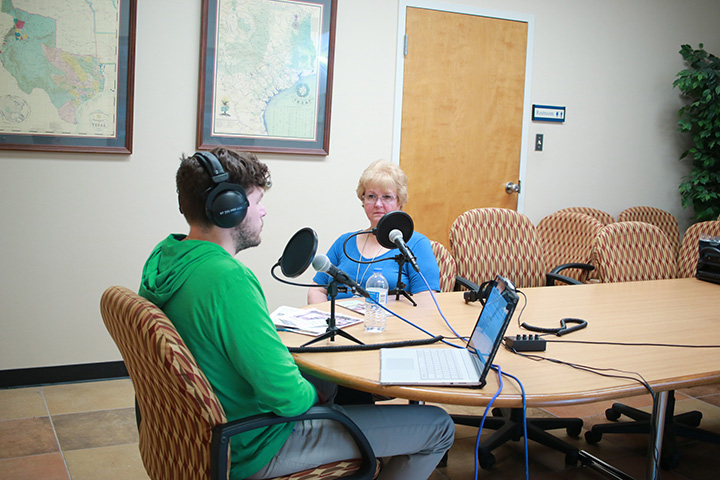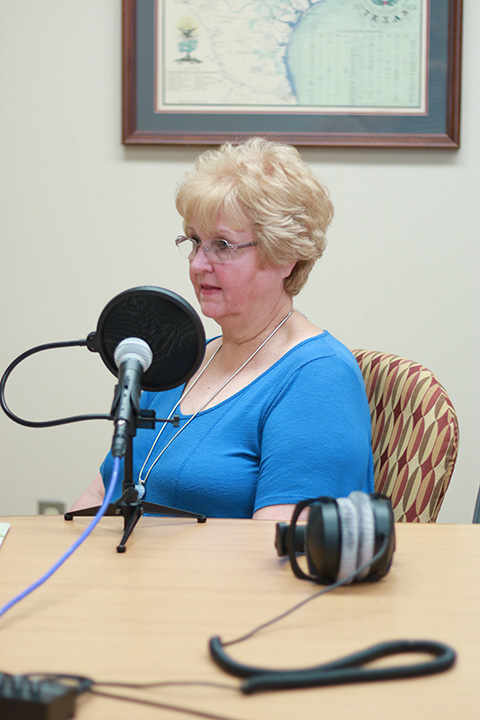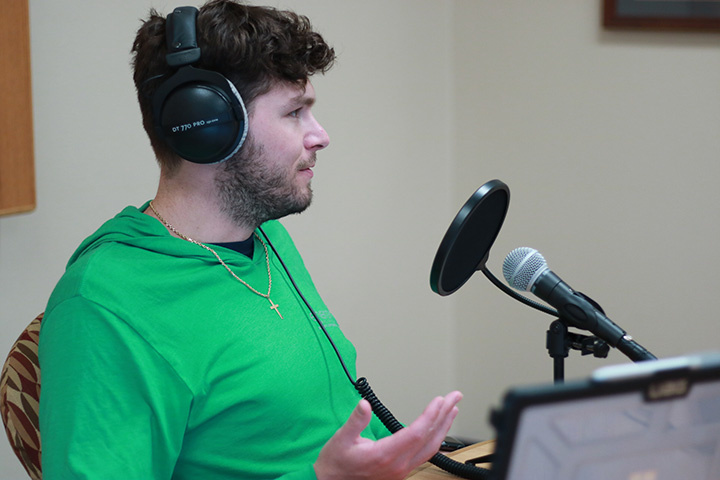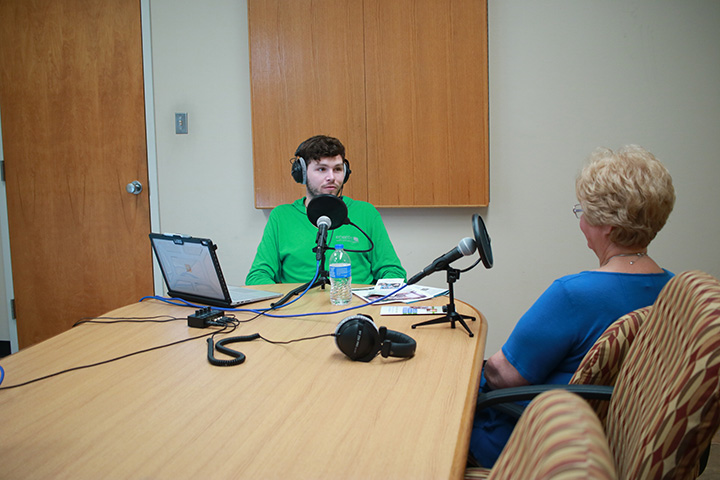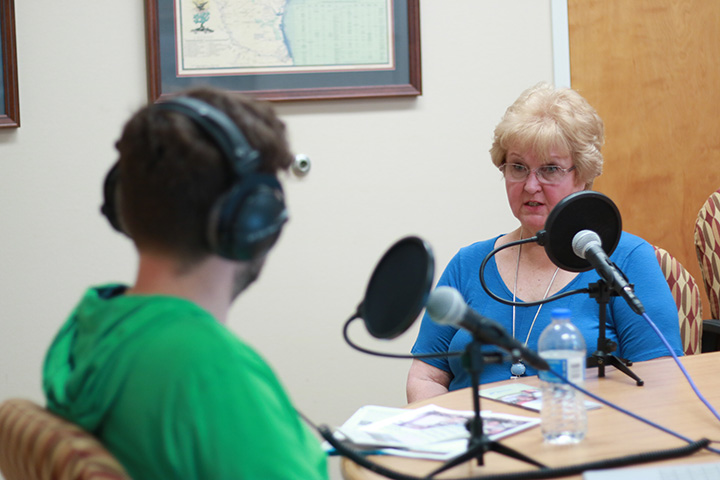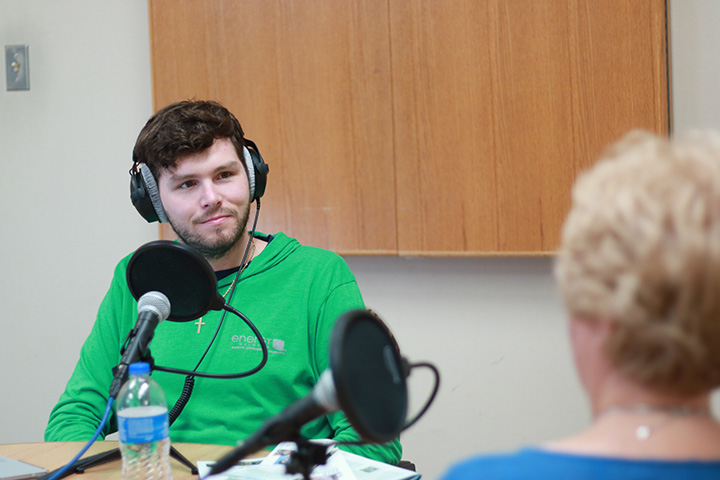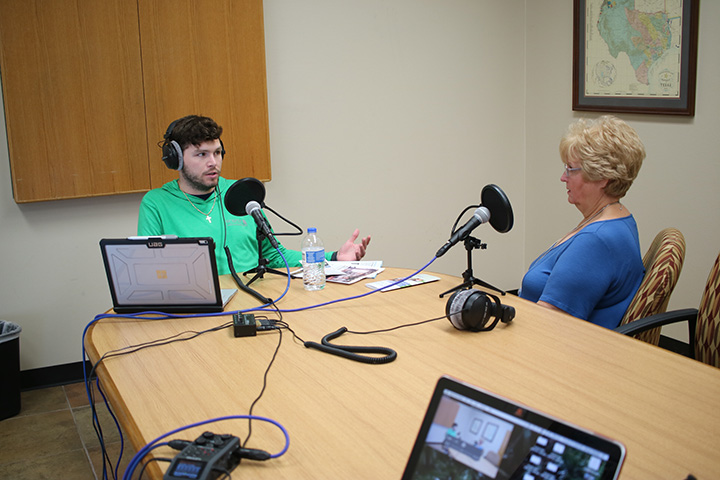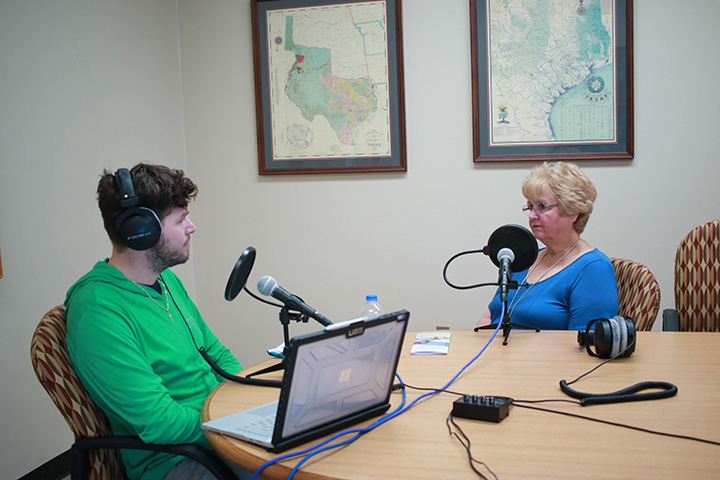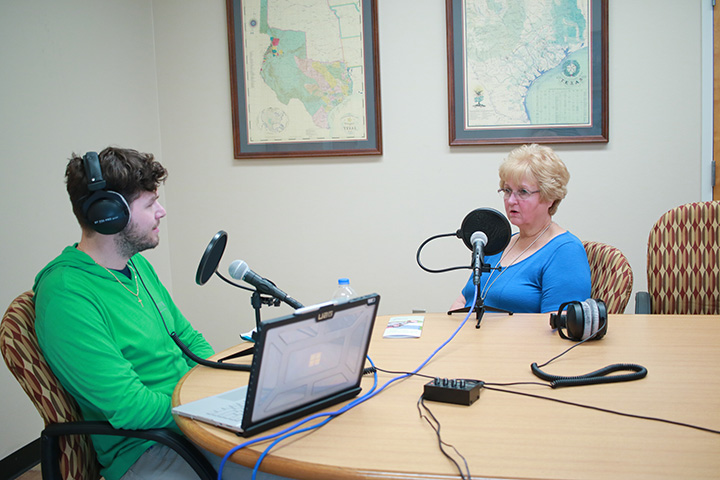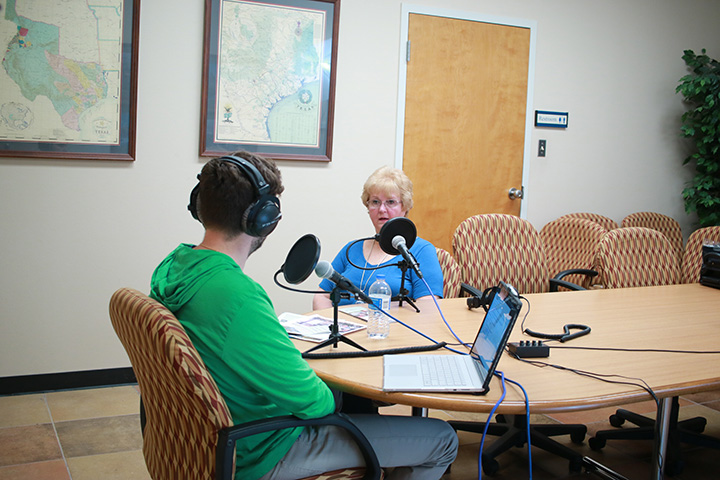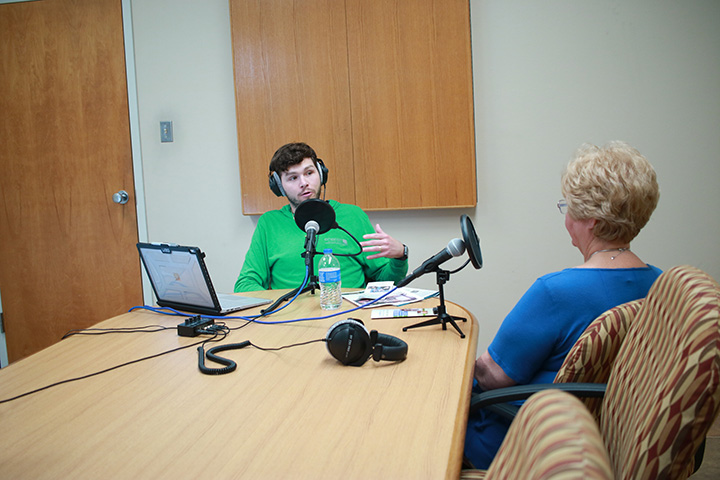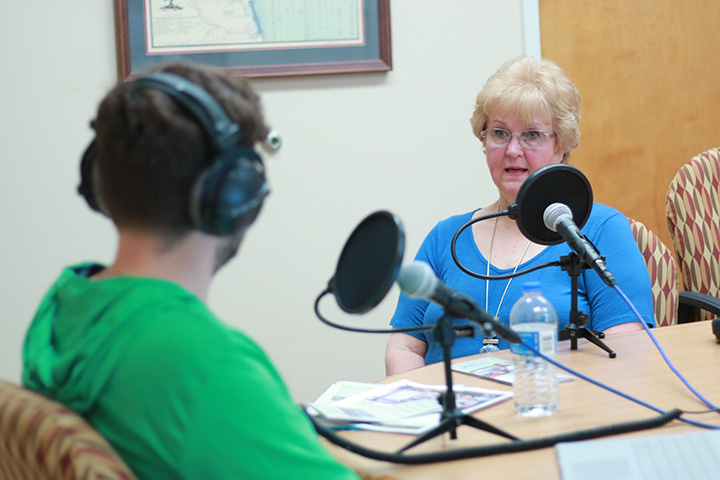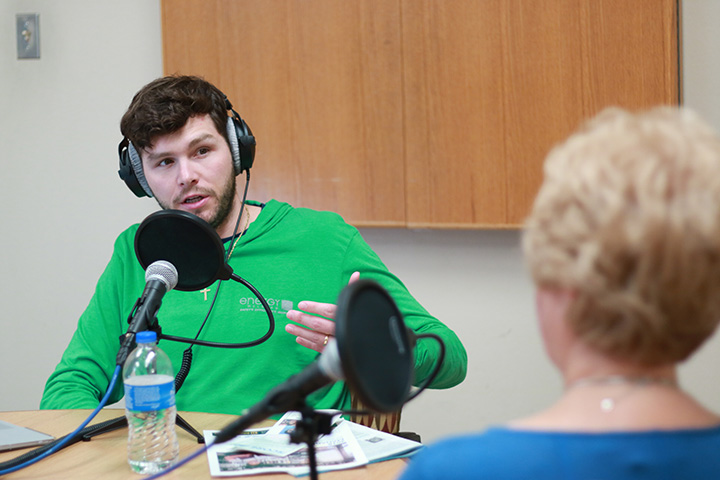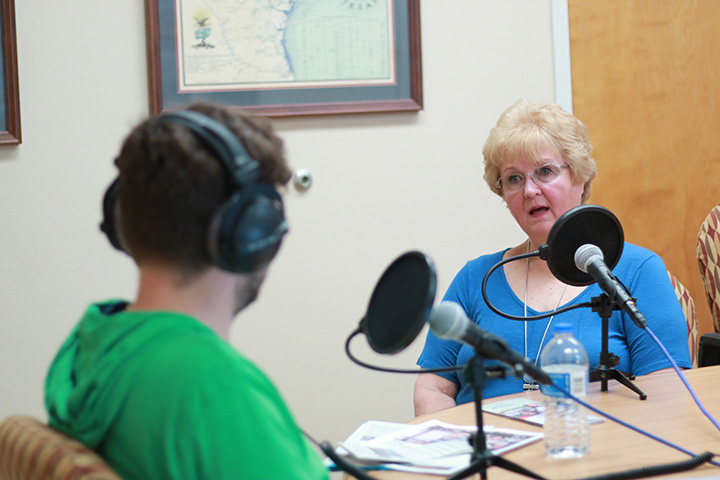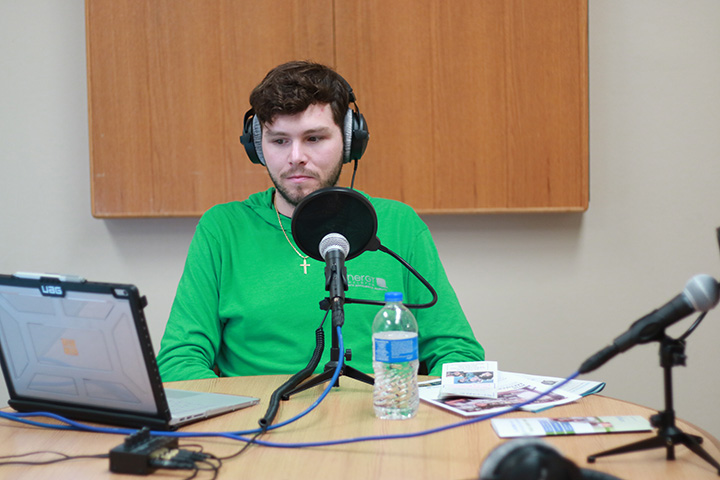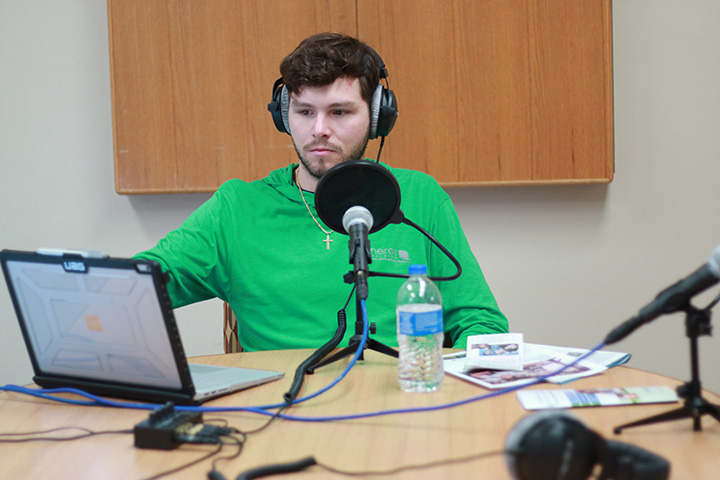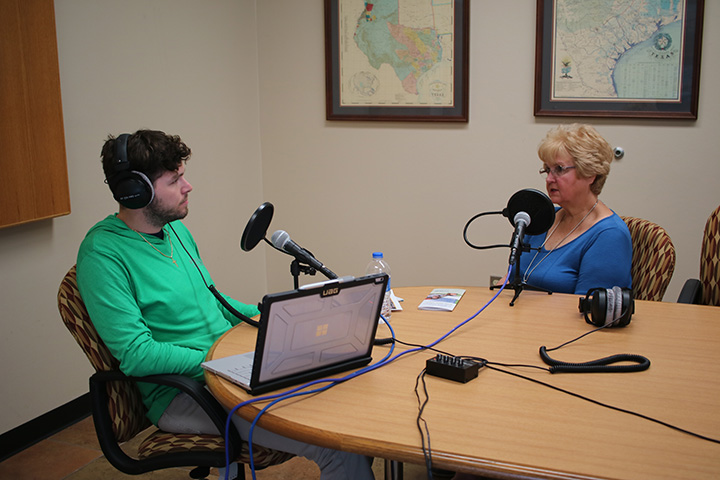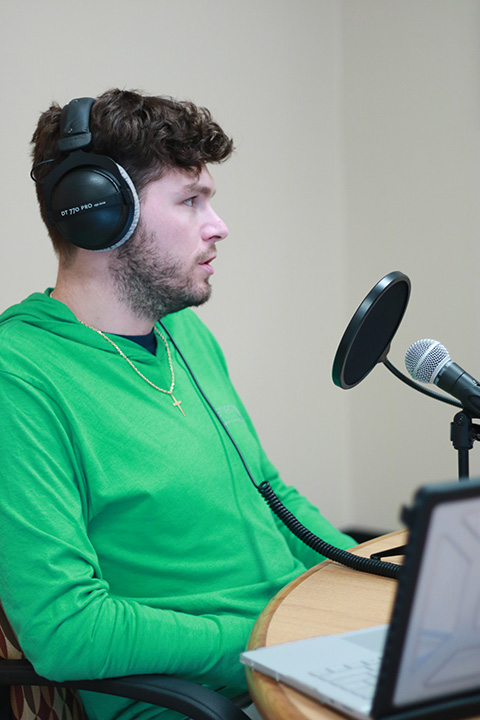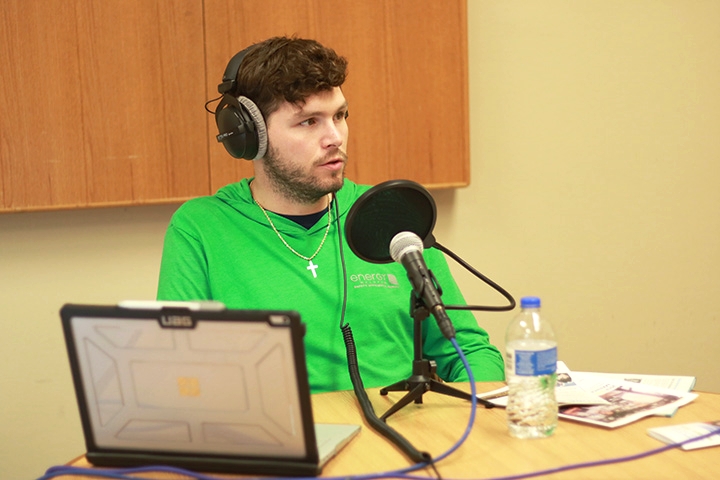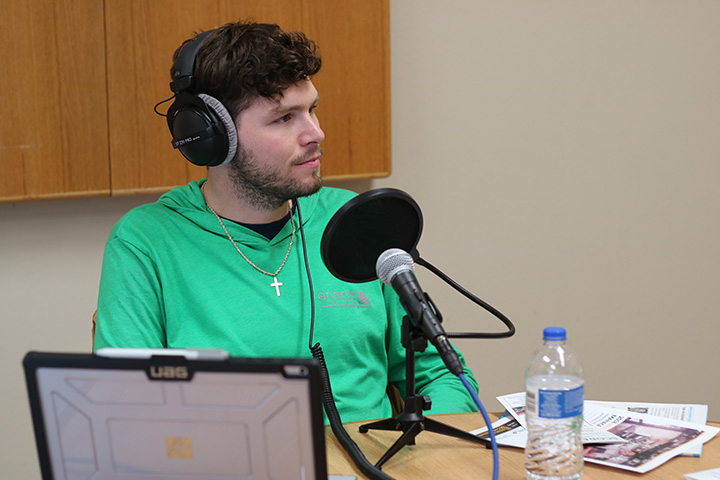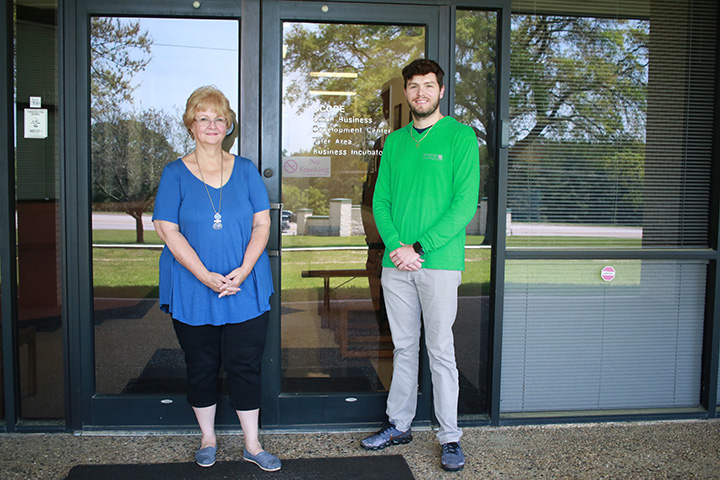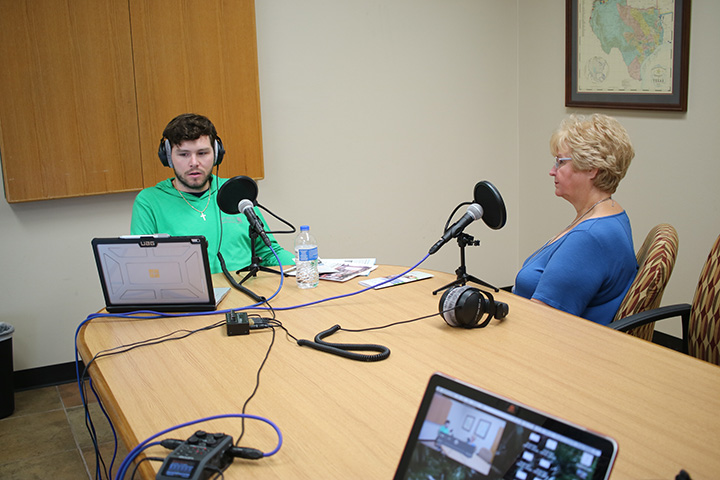Jo McMahan, owner at the Grant Coach introduces Michael to SCORE, an organization that provides free, confidential business education and mentoring. In addition to the resources offered by SCORE, Jo and Michael discuss utilizing masterminds and Facebook groups.
Show Episode Transcript
Manufacturing Leadership
SCORE and Resource for Leaders with Jo McMahan, Owner the Grant Coach
Welcome to manufacturing leadership, a podcast for young professionals in and out of the oil and gas industry. And now here's your host, Energy WeldFab’s Michael Clements.
Michael C.: Hello listeners, welcome to manufacturing leadership, and oil and gas podcast, I'm here with Jo McMahan and she is the owner and president of the grant coach. How are you doing today Miss Jo?
Jo McMahan: Doing great, thanks for having me.
Michael C.: Yes ma'am. We're excited we're here at Tyler Junior College West Campus here in in Tyler; we got out of our four walls at Energy WeldFab and decided to come over here, and thank you for having us here.
Jo McMahan: Well we're glad to have you, glad to talk to you a little bit.
Michael C.: Yes ma'am, well we're excited and I think our listeners are really going to get a lot out of this show today. You know just shooting around a little stuff before we started going on, I was learning more about your organization and why you started. But before we get into that I would like to get a little background on you, so tell us a little bit about yourself?
Jo McMahan: Well I've lived in Tyler area almost all my life, got a grown daughter, got a couple of dogs, spend most of my time keeping them apart, so I'm just an East Texas person from way back.
Michael C.: So you went to Texas and Commerce and UT Tyler?
Jo McMahan: Right did that, and I worked for the school district in here in Tyler for many years, and then moved over to UT Health Center and worked for them for a while before I retired.
Michael C.: It sounds like you love East Texas; it's a hard place to leave once you're here, right?
Jo McMahan: It is I love the trees.
Michael C.: Well and then also how did you get involved with the grant coach?
Jo McMahan: Well I had been doing grants for the school district for a long time, and then moved over to the health center and also did grants at the health center. And then when it was time to retire I just decided that's what I knew, and I decided to, I liked working with nonprofits and so just continued doing grants for them on a contract basis.
Michael C.: And the grant coach what was your motivation to I guess start that?
Jo McMahan: Well besides writing grants for others, I really like teaching other people how to write grants, so they can do it within their organization and do a better job and they won't have to hire someone, so I enjoy teaching and helping others learn how to do what I do.
Michael C.: And that can be critical for a non-profit.
Jo McMahan: It is, it's very critical and people say oh that grant writing is boring, but it's really not and when you get one it's like winning the lottery. You get very excited because you've got some money coming in for your organization.
Michael C.: And grants what they're only a couple pages long, right?
Jo McMahan: Oh yes, some people say well you evaluate them by the pound, how many pages is it. It's a lot of work and it's tedious because you have to really know how to read the guidelines, and give them just what they want. And so that's the boring part I guess, but once you know how to do it then you can do it, it's something you can learn.
Michael C.: Would you say you have to have a passion for it if you want to learn it?
Jo McMahan: Yes, I think so.
Michael C.: I can see that. So you started the grant coach and what year was that?
Jo McMahan: Oh gee I did it off and on just for 25 years, but then I when I retired in 2006 I believe I really got serious and decided I wanted to really start it as a business.
Michael C.: So you retired and got serious about starting your business?
Jo McMahan: Right.
Michael C.: Oh that's funny; usually it's the other way around.
Jo McMahan: Well I realized I retired and then I went back to work a couple of places, and I realized that I was not very good at taking orders from other people anymore, so I thought I better be my own boss so I started this business.
Michael C.: Wonderful, it sounds like you're helping a lot of people out.
Jo McMahan: I'm enjoying it, and that's kind of one reason I started working with score because they helped me get my business started.
Michael C.: Yes. So yes let's talk about score a little bit, how did you get involved?
Jo McMahan: Well like I said I came to them when I got serious about starting my business, so I came to them and they counseled me and asked me a lot of questions that I hadn't thought about, and sent me off and said come back in two weeks with the budget for what you think you're going to need for your business.
And they talked to me a lot about how I was going to do my pricing, so they helped me really think through more than just don't think I'll start a business, and then after they got me started then they asked me if I would like to be one of their volunteers and work with other businesses. So oh yes okay I'll give back a little bit, so...
Michael C.: And what does SCORE stand for?
Jo McMahan: Well a long time ago it stood for special corps of retired executives, but now it's expanded so much not everybody is a retired executive, I've never been an executive, so it's just kind of score now it doesn't really stand for anything except for business mentoring and helping other, entrepreneurs, small businesses, people that want to learn more about running their business.
Michael C.: And it sounds like a lot of times when you're starting your business, it's not necessarily you need someone just to tell you what to do, a lot of times it's someone needs to ask you questions, right?
Jo McMahan: Exactly, someone will come in to one of our volunteers and they'll have a really good idea but they haven't thought it through, so we start asking how much money you're going to need, have you ever had experience in this area. So we ask them questions that maybe they haven't thought off that they need to know about, before they put some money into this venture.
Michael C.: So what's the question that always gets everybody is there just one single question or there are a few out there that whenever you all ask that when you know okay this is the one we've been waiting to ask?
Jo McMahan: Well I think one thing is you had experience in this and a lot of times they have not, they just think it would be fun to do but they haven't had the background and so then they realize I better do a little more research and that one comes up a lot. And then a lot of times they don't know the licensing, where to file for different further sales tax license and different things like that that we can lead them to.
Michael C.: And so where are all this SCORE?
Jo McMahan: SCORE is we're throughout the United States, we're a national organization. I think there are about 300 different locations and different councilors, Dallas there's one here with the East Texas score and it's a national and we are partially funded by the Small Business Administration. So we kind of get people ready to move to the next step, which would be maybe to get a small business loan or go take it further and get their business plan that sort of thing.
Michael C.: Okay. So all over the nation SCORE is helping businesses get started and it doesn't sound like there is, if you're wanting to start a business this is a group you can seek out.
Jo McMahan: That's right and there's no cost, we're all volunteers and you can come in as many times as you need to get clarification on what you want to do. We've got lots of materials and the score website is unbelievable with the amount of free webinars, free information, and templates so it's a really good place when you're exploring starting a business or you want professional development if you're already in business.
It's a great place to start that doesn't cost any money. It's not really do it yourself, it can be do it yourself but there's always SCORE mentors that can help guide you.
Michael C.: And you probably can't get enough good advice whenever you're starting your business.
Jo McMahan: That's right; it's always good to have other people look at it. And most of the time, like for our SCORE mentors we have people come in that they want to start a restaurant, well as a mentor I may not know about a restaurant, but I can ask questions that they might need to consider before they do start a restaurant. So it's good to have lots of perspectives on your business idea before you start your business.
Michael C.: Do the volunteers do they have prior experience, they have training, and how do you know you can rely on these volunteers?
Jo McMahan: Well all of them have had some kind of business experience, a lot of the folks in our group here in East Texas are actually we've got retired executives from IBM and Xerox and Exxon, so they've had high-level experience. Then there's a few like me that have just started my small business, and it's just me running my business.
So it doesn't really matter as long as you've had some business experience, you can be a mentor and someone who comes in can rely on what we've done. We say we're not lawyers, we're not accountants, we're not giving you official advice, but we're giving you information based on our experience and we try to point someone in the right direction.
Michael C.: You get so excited when you're starting your business that I guess there's a lot that can be overlooked, where it sounds like these volunteers and mentors can really help a business or an individual who does it. Maybe they know what they want to do, but they don't know how to do it or the proper regulations.
Jo McMahan: Exactly, and that's one reason why the website is so good. Because if someone comes in and one of the first things they need to do, no matter what they're going to do is a business plan, well on the website there are business plan templates that they can go in and write as extensive a business plan as they need.
It could be on the back of a napkin, or it could be several pages depending on if they need to take it to a bank or need to get a loan or if they're just trying to think it through on their own. So we try to provide resources and make sure that they've thought through everything before they jump in feet first.
Michael C.: That's so exciting to hear that quality of the volunteers that are a part of the program, and that you have the opportunity to come in and have free mentorship that's extraordinary.
And to hear that hey it's not just somebody who said hey I'm going to go and volunteer my time, which that wouldn't be a bad thing but it's someone who has started a business like yourself or someone who has been a part of a company, and the challenges of starting out of business like I said you get so excited that you go oh yes we're going to do this, this and this. And before the show we were talking a little bit about budgeting in a company, what do companies run into whenever they're starting?
Jo McMahan: I think they don't think through the budget, they're so excited about having a business and doing something, they don't think about what it takes, what's it going to cost me to get this started. Am I going to buy a franchise, am I going to need a truck, they don't think through every little step and put pencil to paper and really consider what's this going to cost me. So that's one thing we figure out your budget, figure out your business plan, come back and let us look at it.
Michael C.: How many businesses do you see come in that are from the start already undercapitalized?
Jo McMahan: Oh people come in, sometimes they come in we see them one time and they have an idea and we never see them again. We've had some and this is not my area of expertise, when you give me a column of numbers I'm out of it right then. But we've had some come in and they've got a going business but they're having cash flow problems, and so that's not my area so we call in somebody else that's what they're really good at and they come in and help that.
Michael C.: That's so good. I mean when you're an individual and you're struggling in your business, say you're a few years in well a lot of times maybe you didn't get off to the best start, maybe there was something in the economy that occurred or maybe you jumped to step seven without taking care of steps four, five and six before that.
But the neat part about SCORE is that whether you're starting your business or you're maybe in a pickle, it sounds like they can still come to you and you're going to be able to get them good advice.
Jo McMahan: That's right, we can and if we don't have the expertise here, the good thing about it being a national organization is we can go online and we can find. Let's say someone comes in and they want to do imports and exports, they want to do business overseas, well nobody here has that expertise, but someone in SCORE does and we can search the SCORE database and we can find them someone who has that expertise and we can connect them up with that person. So it's not just the group here, it's anybody throughout the United States we can connect them with.
Michael C.: And how often do you see someone come in who is leaning on a mentor, a part of the program you said sometimes you'll have someone come in one time and you won't see them again. But the folks that do return, how long do you see them stay with the mentor?
Jo McMahan: They can come in, some of them stay until they are established our going business, some of them just come to one time and they've got everything together and all they need is answers to a couple of questions.
So they can come back as often as they want, as often as they feel like it, sometimes we just do a little follow up, we might seek a member that they were going to open a bouncy house business, and we might see something in the newspaper about needing insurance for bouncy houses and so we'll send them that information, not that they have to come back in, but we try to keep up.
Michael C.: Just trying to help.
Jo McMahan: Yes, try to help and hey did you see this and so we try to keep up with them and then welcome them back anytime they want to come back in.
Michael C.: As I've spoken with experienced leaders and even some of our past guests, that's one of the things I've heard is I just want to pass along my knowledge, I just want to help somebody else out and that was really one of the foundations of our show was it's so easy to make mistakes early on especially when you're young, and one of the things I just didn't want leaders to get discouraged.
And you may have someone that could potentially be a CEO of a fortune 500 company one day, but if they gave up just because maybe that didn't get their tax ID number or something that would be awful. The fact that you all's organization can help an individual get through those moments that's terrific, and I wish I would have known about SCOE before I started my business, at times I was that guy that was at step seven before I accomplished steps four, five and six.
Jo McMahan: All right, of course you can find anything on the internet, but how long would it take you to find that, whereas you could just pick up the phone and say can I come in thirsty and talk to you about so-and-so, and it's a lot easier. And then we would probably do a little research before you came in, and we might have a few the answers already ready for you.
Michael C.: And you were mentioning you had some templates and things on your website, tell us a little more about that.
Jo McMahan: Oh the website is just a phenomenal resource, there are webinars you can take, there are articles, there are templates for business plans, the financials just about anything you want there's a template so that you can go there, you don't have to create it yourself. There's something there already for you if you're going into business, that you can pull up and you don't have to create the wheel, it's already been done for you somehow.
Michael C.: Whenever someone's starting a business they got to be headstrong or something, I mean there's something that makes someone tick and says hey I want to start a business and most the time you're on such a high because you're moving forward with these big plans, and you're doing all this.
From experience I got caught up thinking like I got to create all this myself, I have to do this myself, so hearing that there's templates out there I can think of just a few things that the templates would have helped tremendously. And how many different, is this something that it doesn't matter the industry you're going in you're able to assist somebody?
Jo McMahan: Exactly, we just give them the basic business information and it doesn't matter what type of business they want to go into, there are certain basics that you have to have and then so we try to point those out.
Since I'm a small business I look at part of my job is to ask the stupid questions of someone who's wanting to start a business, that maybe I didn't ask when I was first starting mine. And so we just try, we can work with anybody and given them those basics and then if they want something beyond that, then we will try to match them up with somebody else.
Michael C.: Is there a time limit or anything, whenever someone comes in is it do you have 10 minutes with the mentor, do you have 30 minutes how does that work?
Jo McMahan: We have an hour and a half, our appointments are an hour and a half, and then usually we talk to them on the phone ahead of time, and set the appointment up and try to get a little information. And then they come in and then if they want to come back another time, like you set up another appointment. So there's really no time limit as far as how often we see them, but the appointments are an hour and a half.
Michael C.: Okay, and is there any qualifications to be a mentor?
Jo McMahan: Have some business experience, have a little bit of time to give, SCORE provides some training as far as how to be a mentor, how to work with people so we do to go through a little bit of training before they don't just throw us in, and then we as mentors we work with an experienced person for a while. And then we usually work with partner, like this morning we had someone come in and there were two mentors, just because it gives two different perspectives on things.
Michael C.: How about the small business management certification, tell us a little bit about that.
Jo McMahan: We do it in conjunction with Tyler Junior College and the Small Business Development Center here at Tyler Junior College. It's a seven week course and you get a certification when you're done, and we cover a different topic it's either for people starting out that need to know these are things I need to think about, or it's for people who may have a lot that are already in business, but like you say they got their business started then they go oh I wish I knew more about this topic.
So we have either the score mentors teach it, or we bring in local professionals, we bring in an attorney that talks about legal aspects of your business. So we try to bring in professionals that really know what they're talking about.
Michael C.: Yes, I can imagine if you've never been around business lingo or heard some this stuff it's got to sound like Greek to you. Yes, on the small business management certification, I see you have business planning, legal considerations, financing a business, business insurance, accounting and taxes, sales and marketing and case studies are all the subjects that it shows that are going to be discussed during the seven week course. I think that's exciting and something that a business leader or someone who's willing to start a business definitely can learn from, just hearing some of these things in here as far as accounting and taxes.
Sales and marketing most the time someone's starting a business because they know they have a customer, and so but how are you going to take care of them, how are you going to take care of the second customer that you don't have yet. A lot of times it's a personal relationship and that's who you're selling to, or who your service is going to be for starting out. But you can't grow a business off one person or one customer.
And so as you start to learn and grow your company, you have to be able to say okay where's our customer service going to go, do I actually know how to have good customer service and not just for my buddy or for my friend that maybe we're performing this service for. On these subjects, how long is each class, how in-depth are you all going to go in there?
Jo McMahan: Each class is two and a half hours, and then sometimes it goes over because we have questions and answers, there's usually a presentation I could say about either a local expert or one of the score mentors that has experience in that. And there's class, there's interaction with these people in the class and that's good because some of the people there have just started a business, some of them in a going business so there is a lot of give-and-take between the students and sharing their experiences too.
And you're right you were talking about where's my next customer coming from, and that's one of the things we're going to talk about in the marketing class is word-of-mouth. Nobody goes to the to the Yellow Pages anymore, you ask your friend on Facebook, you say I need to get a recommendation for a dentist so we're going to do a lot of talking about how to get the word out that you're there and build those relationships.
Michael C.: Yes, I still get a phone book I don't know why, it's funny. So how can someone go about getting connected with SCORE?
Jo McMahan: Well the easiest way, the fastest way is to go to SCORE.org and there will be a place there where you can put in your zip code or your city and it will connect you with our chapter, and then we will get a notice thing so-and-so has signed up, would like a mentor and then we will reach out to that person and take it from there.
Michael C.: That's terrific. So SCORE it sounds like a wonderful organization, great opportunity for someone who's either in business or is wanting to go in business to speak with a mentor. But what if you're in an area, I mean we're in a rural area but luckily enough here in Tyler there is a SCORE. But just a couple hours away from here it's just a bunch of pine trees, so what does someone do that lives in an area like that?
Jo McMahan: Besides SCORE and all the great resources there, one other way that I've learned or I've come upon professional development is a mastermind, and there's a couple of different ways if you go online you can look for masterminds in whatever industry you're in. And they can be online groups or physical groups that are right there where you are, and you just bounce around ideas. You hold each other accountable, usually it's a group that maybe meets once a month, they have a structure, you talk about certain things.
Sometimes some of the masterminds I've seen they call them hot seats, and somebody takes their business and says here's what I want to do, and everybody chimes in on ideas. The masterminds that I've been in have been more like two or three friends that have gotten together, and were either all in the same business and we want to talk about things that pertain to our business. And what have you done about the Israel, what's a good resource for this. Or sometimes I like to be with two or three folks that we all have different businesses, and then I come in and I say oh I've got a good idea this is what I want to do, and somebody say well have you tried this, well I found this.
So we have different perspectives and we come at it from different angles, so mastermind is good just to have other people to talk to and bounce ideas around, hold you accountable, it's a good way to build for a professional development that doesn't have to cost money, there are masterminds that cost a lot of money.
Michael C.: What would you say to someone out there who's maybe thinking about starting a business?
Jo McMahan: Well first go SCORE talk to people that are already in the business, look online and see what else is out there, what are other people doing. But get with other people and bounce those ideas around, because just because you have what you think needs to happen there are a lot of other ways to do things, there are a lot of other ideas, you don't know it all, you can't find at all but you'll be surprised at what a friend can help you with it.
Michael C.: It sounds like the mastermind you could connect with someone all over the country?
Jo McMahan: You probably could Facebook groups, I've joined a lot of Facebook groups that you just pop in a question and you say hey does anybody here have experience with so-and-so, I need some help and then other people in the group will come back and comment and it's a great way just on Facebook group that I stumbled upon.
Somehow I don't even know how I got to them, and there are thousands of members on this group. So if I wanted to know more about how do I set up a grant writing business, there are going to be people on there that say hey I did something similar and here's what I did, and this is how I wrote my contract.
Michael C.: And that can save someone so much time.
Jo McMahan: It can, because most these people have already had experience, they can tell you what they did wrong so you don't have to make that same mistake.
Michael C.: We have a funny saying in manufacturing, we didn't have time to do it right but we had time to go back and fix. It's the same thing as starting a business, take the time to do it right the first time, my dad always says measure twice, cut off once.
Jo McMahan: That's right.
Michael C.: Same thing in starting a business, measure twice cut off once it's going to save you the time and a lot of things you could knock out in your first few months of starting a business, if you don't do those things those are the things that are going to sneak up and bite you after year 1 or year 2.
It was a privilege coming over and getting to hear more about SCORE and I'm really hoping our listeners, and if someone's out there who's listening and says hey I'm looking at starting a business, and they're in the East Texas area, I hope that they will seek your organization out and come get some of this free mentorship, that free mentorship may save you or may make you thousands and millions of dollars you never know.
Jo McMahan: That's right, we appreciate being able to let folks know we're here because sometimes people struggle trying to figure out who's going to help me with this, and we're here to help if they could just find us.
Michael C.: Well how can our listeners get in touch with you?
Jo McMahan: Well me personally I have a website, thegrantcoach.com and there's a contact there, a contact form there that's the easiest way. And then my email is Jo@thegrantcoach.com.
Michael C.: That's great. And so if you're looking and you need help writing a grant Miss Joe can definitely help you out, but also if you would like some more information on SCORE, fire her an email or you can also fire us an email at Podcast@EnergyWeldFab.com and we can definitely send you some information over. Miss Jo just want to thank you for the hospitality today, having us over here in Tyler, this has really been a privilege. Do you have any last words for our listeners?
Jo McMahan: SCORE would love to talk to you about your business idea or point you in the right direction if you're not the place you need to be, we have a lot of contacts and we would just love for people to come over and let us help you out.
Michael C.: Great, it's so awesome people helping people and there are a lot of good people in this world. And really excited to hear about your organization, to hear about the great mentors and the volunteers that are a part of it, and hopefully you all's organization will only continue to take small business leaders and owners and people that are looking at starting their business, and continue to help them and help them grow as individuals.
Jo McMahan: Thank you.
Michael C.: Yes ma'am. Well thank you for having us and thank you again for listening today, if you'd like to get in touch with us email is Podcast@EnergyWeldFab.com we're also on Instagram, Twitter, LinkedIn and Facebook @EnergyWeldFab so we'd love to hear from you.
And if you would go ahead and like the show, follow and subscribe we'll like to hear from our listeners and if you have any ideas for us or for good shows or also leaders in your community that you'd like for us to reach out to and speak with, send us those comments we'd love to hear from you. So once again Miss Jo thank you, we had a great time here today, I think our listeners were able to get quite a bit out of this show, so thank you and we'll be seeing you again soon.

